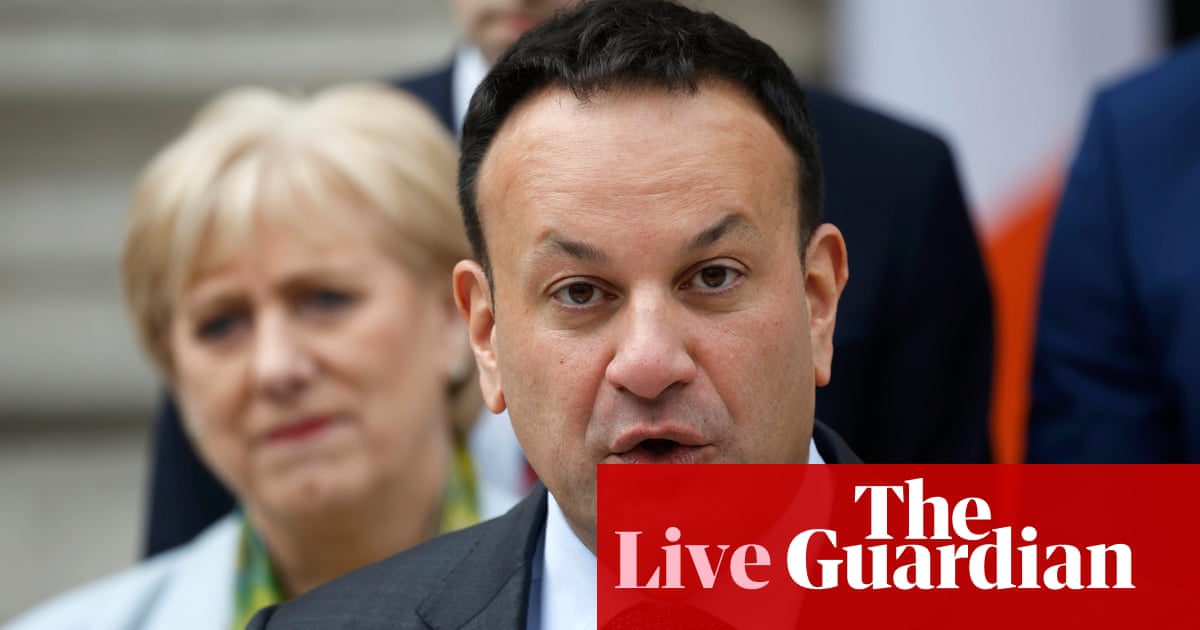
Rayner: "Far from watering down" employment policy, Labour promises to legislate improved rights within 100 days
Labour’s deputy leader, Angela Rayner, has said that “far from watering down” the party’s commitments to improve workers’ rights, it will be setting out “in detail how we will implement” changes, and promised the party would legislate to protect rights within 100 days of coming into office.
Her long thread on social media comes off the back of reports today in the FT that the party is planning to water down some of its previous policy positions. Rayner wrote:
Labour’s New Deal for Working People will be the biggest levelling-up of workers’ rights in decades – providing security, treating workers fairly, and paying a decent wage.
We’ll tackle insecure work by banning zero-hours contracts, ending fire and rehire, and ending qualifying periods for basic rights, which currently leave working people waiting up to two years for basic protections.
We’ll make work more family friendly by making flexible working a day one right except where it isn’t reasonably feasible, strengthening protections for pregnant women and by urgently reviewing parental leave.
And we’ll make sure work actually pays with a genuine living wage that covers the cost of living, ensuring fair tips, boosting collective rights - and by speeding up the closing of the gender pay gap.
I’m proud that we developed our comprehensive New Deal together with Labour’s affiliated unions. Far from watering it down, we will now set out in detail how we will implement it and tackle the Tories’ scaremongering.
Tackling bogus self-employment is a key priority for a Labour government, and stronger protections against unfair dismissal will mean workers can no longer be sacked without reason from day one.
I’m delighted to be in Scotland this week – meeting apprentices in Glasgow – to explain why only Labour can deliver a New Deal for Working People in Scotland and across the UK. We know this will resonate in workplaces and on the doorstep.
The New Deal will be a core part of our manifesto and our plan for growth, raising living standards for all. We’ll bring forward legislation within 100 days of taking office.
Summary of the day
Labour has partially rowed back from its policy on boosting rights for those working in the gig economy as it seeks to head off Conservative attacks on its approach to business in the run-up to the general election.
Angela Rayner, the party’s deputy leader, whose portfolio covers workers’ rights, said on Friday morning that Labour still intended to ban zero-hours contracts, tackle bogus self-employment and end qualifying periods for rights, in the “biggest levelling up of workers’ rights in decades. “Far from watering it down, we will now set out in detail how we will implement it and tackle the Tories’ scaremongering,” she added.
However, the party’s policy forum in July changed the wording of the pledges on workers’ rights to suggest there may be more flexibility in its approach. Labour had been planning to create a single “worker” status for all but the genuinely self-employed, ensuring the same rights for everyone regardless of sector, wage or type of contract. The forum agreed last month to consult on this policy after entering government to create “a simpler framework” that differentiates between workers and the genuinely self-employed in a way that would “properly capture the breadth of employment relationships in the UK” as well as ensuring workers can still “benefit from flexible working where they choose to do so”.
The number of UK-based students in clearing who are trying to find higher education courses a day after exam results were released has jumped to its highest level for at least a decade – though plenty of places are still available, figures show.
A leading forecaster has predicted the typical gas and electricity bill will move to an average of £1,823 a year from October after the regulator, Ofgem, announces its energy price cap next week.
Train drivers in England are to stage a fresh strike in their attempt to secure a pay rise. Members of Aslef will walk out on 1 September and will ban overtime on 2 September, the same day as a strike by the Rail, Maritime and Transport union (RMT). Mick Whelan, Aslef’s general secretary, said the union have had no contact with employers since 26 April or with the government since 6 January. Train routes running to and from Scotland and Wales will also be affected.
The Northern Ireland policing board is to hold an additional meeting over last week’s major PSNI data leak. A spokesperson for the board, which oversees policing in the region, said members will receive an update from the PSNI chief constable, Simon Byrne, and consider any further actions necessary. A man has been arrested in County Derry investigating criminality linked to the leak.
The oligarch Eugene Shvidler, who had sanctions imposed on him after the invasion of Ukraine, has lost a high court challenge against the UK government’s decision to freeze his assets.
Andrew Malkinson, who spent 17 years in prison for a rape he did not commit, has accused the body that investigates miscarriages of justice of having an “attitude problem” and said it has still not contacted him since he was cleared by the court of appeal last month.
The former Scottish Labour leader Kezia Dugdale has said her stance on independence has moved and she can no longer argue for staying in the UK with the same strength she did in the run-up to the 2014 referendum.
High street banks will have to ensure customers can find access to cash within 3 miles of their communities, and those falling below the minimum service level will face a fine, the government has confirmed. It will be seen as a victory for campaigners against digital currencies and a move to a cashless economy.
Transport for London (TfL) has vowed that vandalism of ultra-low emission zone (Ulez) cameras “will not stop” the scheme’s expansion, due to start at the end of August. The transport body issued the statement after the Metropolitan police said they had recorded 288 crimes relating to the cameras as of 1 August.
A leading architect of the Freedom of Information Act has called for a parliamentary review into the system after there were serious data breaches by police forces in responses to FoI requests.
Environment secretary Thérèse Coffey has pledged to do “all we can” to ensure a ban on trophy hunting imports becomes law amid fears pro-hunting peers could “wreck” the reforms.
The British Beer and Pub Association has said it hopes other councils follow Cornwall in permitting pubs to serve drinks from 10am before the England-Spain Women’s World Cup final on Sunday. Michael Gove had written to councils across England asking them to do everything they can to help venues seeking to extend their hours. The Liberal Democrats are still trying to push for a recall of parliament to get licensing laws changed for the weekend. Foreign secretary, James Cleverly, will be able to get a beer, as he has decided he is attending the match in Sydney in person.
That is it from me, Martin Belam. Thank you for reading and putting up with me this week, and thank you for all your comments, which I always find interesting and useful. I will see you somewhere around the Guardian website again soon.
One more thing from that Angela Rayner podcast recording today – she claimed “the landscape has changed towards Labour” in the last couple of years in Scotland.
PA Media reports she said:
We’ve been working really hard to earn back that respect because I think we lost it in Scotland, people were very emotionally charged because Scotland has always been traditionally quite a Labour area. I think they felt quite betrayed by Labour for a long time.
Speaking at a podcast recording as part of the Edinburgh festival fringe, Labour’s deputy leader, Angela Rayner, has been critical of disruptive protests, saying “pissing them off” is not the way to bring people with you.
PA Media quotes her telling the comedian Matt Forde that when she was 18 years old she would have seen such disruptive protest groups as an “irritant”, adding: “I don’t think it brings people round, in my opinion.”
She continued: “As someone who’s had to convince the public to go with what I want sometimes, especially as a union rep, pissing them off is not the way to bring them with you, in my opinion, there’s other ways of doing it.”
Rayner: being "safe" and "a little less crap" than the government is not enough for Labour
Labour’s deputy leader Angela Rayner has said that being safe and promising to be “a little less crap” than the government is not a way to win power.
Speaking at a recording of the Party political podcast with comedian Matt Forde during the Edinburgh festival fringe on Friday, PA Media reports Rayner said the party had to show it was “radical, realistic and responsible”.
She said voters do not want to see Labour treating the next election like they “have it in the bag”, but cautioned Labour had to be realistic about what they could achieve in power. She said
I’ll just be safe and be a little less crap than these people and they’ll let me in – that’s not a way of getting there
But you’ve also got to be able to give people hope for the future, but be realistic about what you’re potentially taking on because the Tories have crashed the economy.
We are in a bit of a managed decline spiral at the moment, so there has to be some radicalism in, like, the green prosperity plan and the vision of how we can build the industries, but also the realism of we won’t be able to do everything at the same time.
The Liberal Democrats are still trying to push for a recall of parliament to quickly pass a law so pubs can open early on Sunday morning for England’s World Cup final.
My colleagues Peter Walker and Rowena Mason have been looking at the possible consequences for some Conservative MPs in marginal seats of supporting the rhetoric of the likes of Lee Anderson over immigration:
As political graffiti goes, the message to the Conservative MP Alex Chalk scrawled on some steps in the centre of his Cheltenham constituency was polite, if very pointed. “F**k off back to France?” it began, using slightly coy asterisks. “Really, Alex?”
For baffled locals in the genteel Regency town who have not been following politics amid the summer recess, it was a reference to Chalk’s defence of inflammatory comments about asylum seekers made last week by Lee Anderson, a fellow Tory MP and one of the party’s vice-chairs.
Government ministers often find themselves defending ideas or colleagues they might have little in common with. But as an election looms, some Conservatives are wondering whether the increasingly hard-right, culture war-infused stance taken by Sunak could cost them their seats.
The calculation for the Conservatives – and one being made on a near-daily basis by a number of Tory MPs – is whether this relentless focus on subjects such as small boats could push away traditional supporters with less appetite for populism.
Cheltenham, where Chalk had a sub-1,000 majority over the Lib Dems in 2019, is a case in point. While he is expected to lose his seat, it remains to be seen whether Sunak’s recent embrace of culture war issues, including scepticism about environmental policies, will be a significant factor.
The number of UK-based students in clearing who are trying to find higher education courses a day after exam results were released has jumped to its highest level for at least a decade – though plenty of places are still available, figures show.
414,940 people were confirmed on courses on results day itself – Thursday – down 3% on the equivalent figure of 425,830 in 2022, but up on 408,960 in the pre-pandemic year of 2019.
PA Media reports that by Friday morning, about 53,700 UK-domiciled 18-year-old applicants were recorded as being “free to be placed in clearing”, according to the admissions service Ucas.
This means they missed the conditions of their higher education offer and are now eligible to find places through clearing.
The figure is up slightly on 53,510 at the same point last year and is the highest number since at least 2013.
The British Beer and Pub Association has said it hopes other councils follow Cornwall in permitting pubs to serve drinks from 10am before the England-Spain Women’s World Cup final on Sunday.
PA Media reports the chief executive, Emma McClarkin, said: “The decision by Devon and Cornwall police and Cornwall council to permit all pubs in Cornwall to serve drinks from 10am before kick-off this Sunday is the exact type of flexibility that councils can provide and what the government so helpfully encouraged.
“Football fans and communities want to come together in their local pubs to roar the Lionesses to a historic victory, and we hope other councils across the country follow their example.”
The government has pledged to do “all we can” to ensure a ban on trophy hunting imports becomes law amid fears pro-hunting peers could “wreck” the reforms.
The environment secretary, Thérèse Coffey, said the government will not support any further amendments to the hunting trophies (import prohibition) bill. In a letter to the Humane Society International/UK, she wrote: “It is a manifesto commitment to ban the import of hunting trophies from endangered animals and we are working hard to deliver.
“The bill passed the Commons in March, with the government’s support, and we will do all we can to support its progress through the House of Lords.”
The proposed legislation would prohibit importing body parts from species deemed of conservation concern. The bill, introduced by the Conservative MP Henry Smith, has already cleared the House of Commons.
But a group of peers has raised concerns and tabled amendments that threaten to derail the proposals.
PA Media reports time is running out to consider the bill and it will fall if it does not receive royal assent before the current parliamentary session stops before the King’s Speech on 7 November.
Smith, the MP for Crawley, said he is speaking with the government to try to secure more parliamentary time for his bill.
The Conservative peer Lord Mancroft, who opposes the proposals, said amendments had been tabled in an attempt to “clean up” or clarify parts of the “badly drafted” bill.
He acknowledged it is “very possible” the amendments could halt the bill’s progress and rated its chances as “less than 10%”.
A leading forecaster has predicted the typical gas and electricity bill will move to an average of £1,823 a year from October after the regulator, Ofgem, announces its energy price cap next week.
According to Cornwall Insight, the cap will drop from the current July to September level – equivalent to £2,074 a year – but consumer groups have warned that prices remain “dangerously high”.
Craig Lowrey, a principal consultant at Cornwall Insight, said that despite the small decrease in bills from October, the energy price was forecast to remain far above pre-crisis levels, underscoring “the limitations of the price cap as a tool for supporting households with their energy bills”.
Transport for London (TfL) has vowed that vandalism of ultra-low emission zone (Ulez) cameras “will not stop” the scheme’s expansion, due to start at the end of August.
The transport body issued the statement after the Metropolitan police said they had recorded 288 crimes relating to the cameras as of 1 August. PA Media reports it said:
TfL is working closely with social media companies to identify the people featured in videos damaging Ulez cameras circulating online. Camera vandalism will not stop the Ulez expanding London-wide on 29 August.
TfL’s director of capital delivery, Nick Fairholme, said: “We urge the small minority of vandals who are damaging Ulez cameras to reconsider their actions.
“We have seen evidence of vandalism where cables have deliberately been left exposed so that anyone carrying out repairs would be killed or seriously injured. This is dangerous and reckless behaviour putting lives at risk.”
A leading architect of the Freedom of Information Act has called for a parliamentary review into the system after there were serious data breaches by police forces in responses to FoI requests.
The call by Lord Clark of Windermere, the author of New Labour’s 1998 proposals that laid the groundwork for the law, also follows accusations that Rishi Sunak’s government is failing to disclose information under the act.
David Clark, who as chancellor of the Duchy of Lancaster drafted the Blair government’s FoI proposals, said a serious re-examination was needed to look at whether the correct balance was being struck between the need for confidentiality and openness.
Clark said he thought freedom of information was in a weakened state due to continued resistance from senior civil servants, many of whom still did not recognise its value to good governance.
“I think there really does need to be a serious re-examination of the situation,” he said. “I would set up a parliamentary committee with a general view of examining FoI over the past 25 years, [and] the balance between confidentiality and openness.”
Freedom of information and FoI officers, who handle requests, have not been afforded the status required for the system to work effectively, he said. “We’ve [now] got the result we’ve got at the moment in too many government departments (…) it’s just [regarded as] an add-on.”
Read more of David Batty’s report here: Lord Clark calls for freedom of information review after data breaches
PA Media reports Cornwall council and Cornwall and Devon police have confirmed they will not be enforcing licence conditions for pubs that open earlier than they would usually be allowed on Sunday for the Women’s World Cup final.
Linda Taylor, the leader of Cornwall council, said: “Although it is too late to issue licences to allow our pubs and clubs to open, this is a sensible way forward, ensuring their businesses can benefit from the occasion, and so people can come together to enjoy the match together. I am delighted the police are supporting this move as well.”
The foreign secretary, James Cleverly, will attend the Women’s World Cup final in Sydney on Sunday.
PA Media reports Cleverly said: “All eyes are on Sydney this Sunday. This is an amazing moment to celebrate the very best of women’s international sport with Australia and New Zealand as our brilliant tournament hosts.
“Everyone back home is behind the Lionesses for their first appearance ever in a World Cup final, and I will be there in person to cheer them on.”
Cleverly is also expected to meet Australia’s minister for foreign affairs, Penny Wong, to discuss foreign policy issues, including regional security.
The Northern Ireland policing board is to hold an additional meeting over last week’s major PSNI data leak.
A spokesperson for the board, which oversees policing in the region, said members will receive an update from the PSNI chief constable, Simon Byrne, and consider any further actions necessary.
“Members will also have the opportunity to question other data loss incidents that have been reported over the course of the last week,” they added.
Earlier today a man was arrested in County Derry by detectives investigating criminality linked to last week’s leak.
Additionally, PA Media reports that the PSNI is investigating the loss of a police officer’s laptop and notebook yesterday.
The assistant chief constable Chris Todd said: “It is believed the material fell from a moving vehicle on the foreshore stretch of the M2 motorway, on Thursday 17 August about 4.15pm. The laptop was immediately deactivated and has been recovered. Sections of the notebook remain outstanding. Inquiries are under way to establish the contents of the notebook.”












